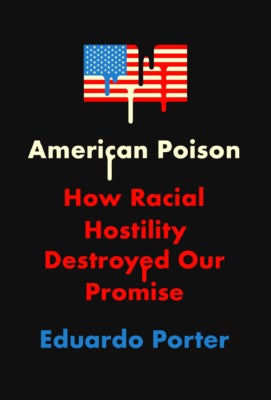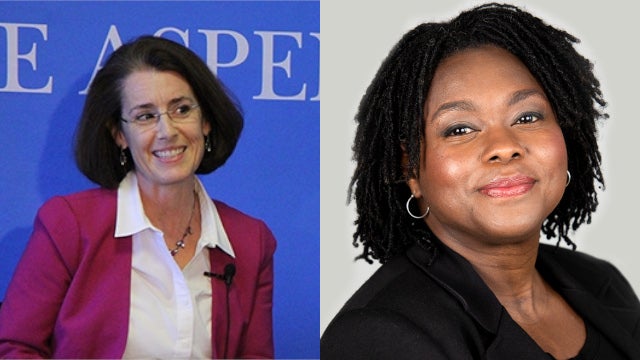Race, Economy, and COVID-19: How America’s Race Problem Exacerbated the Crisis – A Book Talk with Eduardo Porter
Event Description
 The global pandemic has transformed our lives in sudden and unexpected ways. Much is still unfolding, but the available data suggest the economic and human cost of this crisis will be profound. And these costs will not be borne equitably. Our long-standing divides by class, race, and ethnicity are widening as the coronavirus has a disproportionate impact on workers in low-wage jobs and communities of color.
The global pandemic has transformed our lives in sudden and unexpected ways. Much is still unfolding, but the available data suggest the economic and human cost of this crisis will be profound. And these costs will not be borne equitably. Our long-standing divides by class, race, and ethnicity are widening as the coronavirus has a disproportionate impact on workers in low-wage jobs and communities of color.
In a timely new book, American Poison: How Racial Hostility Destroyed Our Promise, New York Times economics reporter Eduardo Porter examines “how racial animus has stunted the development of nearly every institution crucial for a healthy society, including organized labor, public education, and the social safety net.” Now these institutions are failing us all. This virtual book talk with the author discusses how we arrived here and the lessons history holds for finding a better way forward. As we make plans to rebuild from this crisis, we must not repeat the exclusionary mistakes of the past. We can emerge to a healthier society—and a stronger economy—than the one we left behind, if we choose to make it so.
Opening Remarks
 Daniel R. Porterfield @DanPorterfield
Daniel R. Porterfield @DanPorterfield
President and CEO, The Aspen Institute @AspenInstitute
Daniel R. Porterfield, Ph.D., has served as President and CEO of the Aspen Institute since June 2018. He was selected by the Institute’s Board of Trustees because of his intellectual depth, commitment to inclusivity and diversity, and ability to lead a complex, mission-driven organization to create impact and make a difference in the world. His career embodies the ideals of values-based leadership upon which the Aspen Institute was founded. Learn more about Dan here.
Featured Speaker

Eduardo Porter @portereduardo
Economics Reporter, The New York Times @nytimes
Eduardo was born in Phoenix and grew up in the United States, Mexico, and Belgium. He is an economics reporter for The New York Times, where he was a member of the editorial board from 2007 to 2012 and the Economic Scene columnist from 2012 to 2018. He began his career in journalism as a financial reporter for Notimex, a Mexican news agency, in Mexico City. He was a correspondent in Tokyo and London, and in 1996 moved to São Paulo, Brazil, as editor of América Economía, a business magazine. In 2000, he went to work at The Wall Street Journal in Los Angeles to cover the growing Hispanic population. He is the author of The Price of Everything (2011), an exploration of the cost-benefit analyses that underpin human behaviors and institutions. He lives in Brooklyn.
Moderator

Maureen Conway @conway_maureen
Vice President for Policy Programs, The Aspen Institute; Executive Director, Economic Opportunities Program @AspenWorkforce
Maureen Conway serves as Vice President for Policy Programs at the Aspen Institute and as Executive Director of the Institute’s Economic Opportunities Program (EOP). EOP works to expand individuals’ opportunities to connect to quality work, start businesses, and build economic stability that provides the freedom to pursue opportunity. Maureen founded EOP’s Workforce Strategies Initiative and has headed up workforce research at the Aspen Institute since 1999. Maureen also curates a public discussion series at the Aspen Institute, Opportunity in America, which brings together voices from business, labor, policy, human services, media, academia, and others to discuss the challenges experienced by many in today’s labor markets and new ideas for addressing these challenges. In addition, Maureen oversees EOP’s leadership development programs, which connect innovators, both within communities and from across the country, to peers working to help low- and moderate-income Americans access opportunity.
Share
Tweet Virtual book talk (4/29): “Race, Economy, and #COVID19: How America’s Race Problem Exacerbated the Crisis.” Join @AspenWorkforce and @portereduardo to discuss the new book, “American Poison: How Racial Hostility Destroyed Our Promise.”
Tweet The costs of this crisis will not be borne equitably. Divides of class, race, and ethnicity are widening as #COVID19 has an outsize impact on workers in low-wage jobs and communities of color.
Tweet In a new book, @portereduardo examines how racial hostility “stunted the development” of America’s institutions, which are failing us in the fight against #COVID19. How can we find a better way forward?
Tweet As we rebuild from #COVID19, let’s not repeat the exclusionary mistakes of the past. We can emerge to a healthier society—and a stronger economy—than the one we left behind.
Opportunity in America
The Economic Opportunities Program’s Opportunity in America discussion series is taking a pause as we all do what we can to slow the spread of COVID-19. But the conversations about the changing landscape of economic opportunity in the US and implications for individuals, families, and communities across the country remain vitally important. We hope you will participate as we bring our discussions to you in virtual formats, and we look forward to your feedback.
We are grateful to the Ford Foundation, Prudential Financial, Walmart, the Mastercard Center for Inclusive Growth, and the Surdna Foundation for their support of this series.
Learn More
The Economic Opportunities Program advances strategies, policies, and ideas to help low- and moderate-income people thrive in a changing economy. Follow us on social media and join our mailing list to stay up-to-date on publications, blog posts, events, and other announcements.


